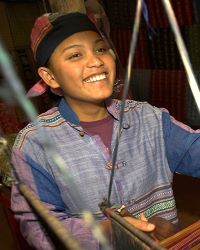The Koho people speak the Koho language, a member of the Mon–Khmer branch of the Austroasiatic family. Their ancestral homeland is in the Central Highlands of Vietnam, particularly the Lam Dong region, where they have lived for generations as part of the highland tribal societies.
After the Vietnam War era and the changes in Vietnam's political and social landscape, some Koho people emigrated to the United States and now live in locations such as North Carolina, especially Greensboro, Raleigh and Charlotte.
In the U.S., Koho individuals navigate the challenges and opportunities of immigrant life: they balance holding onto their ethnic identity, language and cultural heritage, while integrating into American society. Many are adapting to new fields of work, education, and community, often moving into urban or suburban settings rather than their traditional village context. At the same time, they bring with them their cultural legacy: matrilineal family structures (where children take the mother's family name and the husband may move into the wife's family village in traditional society) and traditions of farming, weaving, and extended-family life.
Within the U.S. context they may face generational tensions: younger Koho may adopt English and American-style schooling, while elders may seek to preserve the Koho language and heritage. Their lives involve reconciling this dual identity—both Koho and American.
Traditionally, the Koho practiced animist and indigenous faiths that revered nature spirits, ancestral worship, and a pantheon of deities connected to mountains, rivers and forests. Over time, Christian missionaries began work among the Koho; now a large majority of Koho are identified as Christians in the U.S. Even so, many Koho Christian believers often carry memories or practices of their traditional beliefs and may blend both worldviews. Thus their faith life may be a mixture of traditional custom, family ritual and Christian church involvement.
The Koho in the United States have several pressing needs. Culturally, as immigrants in a new society, they face the risk of losing their language and heritage if younger generations adopt only English and mainstream culture. There is a need for community support to maintain Koho language traditions, cultural gatherings, and identity formation in the diaspora context. Economically and socially, they may need help adjusting to U.S. educational systems, job markets, and navigating two cultural worlds simultaneously.
Spiritually, although many identify as Christian, there is a need for discipleship that is culturally relevant—Koho believers who understand both the Koho cultural background and the U.S. context can serve as bridges. Furthermore, there may be unmet needs for resources (churches, groups, mentors) that speak in the Koho language or understand Koho heritage. Finally, they benefit from meaningful inclusion in U.S. society while preserving their distinct ethnic identity and contributing to both the Koho community and broader society.
Pray for Koho Christian leaders and workers who can relate culturally and bring the gospel in ways meaningful to Koho heritage and U.S. life.
Pray for Koho families navigating two cultures—may God provide unity, wisdom and strength as they honor both their Koho roots and their new home.
Pray that the Koho community in the U.S. will find supportive fellowship, identity-affirming community and opportunities to serve Christ, both within their own group and in the wider society.
Pray for increased discipleship and evangelism resources in the Koho language.
Pray for those who identify as Christians yet mix traditional religion and practices with Christianity.
Pray that they'd no longer grieve the Holy Spirit and rob themselves of the fulness of an authentic faith in Jesus Christ, alone.
Scripture Prayers for the Koho in United States.
Asia Harvest, "The Koho People – Bibles at Last for the Koho of Vietnam"
Peoples of the World Foundation, "The Indigenous Koho People"
Ethnologue entry for Koho language.
| Profile Source: Joshua Project |










